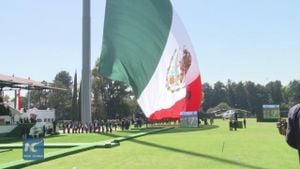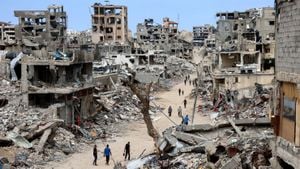Under the patronage of Custodian of the Two Holy Mosques King Salman bin Abdulaziz Al Saud, the King Salman Humanitarian Aid and Relief Center is set to hold the Fourth Riyadh International Humanitarian Forum on February 24 and 25. The theme for this year's forum is "Exploring the Future of Humanitarian Response," which will take place at the King Faisal Conference Hall in Riyadh. The event will gather leaders, donors, humanitarian workers, and experts from around the world, working alongside the United Nations and its various humanitarian organizations.
The forum, which coincides with the tenth anniversary of the establishment of the King Salman Humanitarian Aid and Relief Center, will feature several high-level discussions involving leading researchers and specialists both from within and outside the kingdom. Key topics will include the role of humanitarian diplomacy during conflicts and disasters, the delivery of humanitarian aid, the management of displacements amid increasing conflicts and natural disasters, and various side events and workshops.
Dr. Abdullah bin Abdulaziz Al-Rabeeah, advisor at the royal court and general supervisor of the King Salman Humanitarian Aid and Relief Center, emphasized the timely nature of the forum. He noted, "We are facing unprecedented challenges requiring more efficient and innovative responses," reinforcing the importance of cooperative efforts among governments, international organizations, and civil society institutions to deliver humanitarian aid to those most in need.
According to Al-Rabeeah, the forum will serve as a unique opportunity to develop new strategies and strengthen the use of modern technologies within humanitarian efforts. It will also officially launch the World Health Organization's emergency health appeal for 2025, aimed at establishing a comprehensive plan to respond to urgent health crises worldwide. The topic of artificial intelligence within humanitarian work will also have dedicated attention, showcasing the latest technologies and innovations to improve humanitarian response efficiency.
Meanwhile, Bahrain has seen significant cultural activity recently, particularly through the "From the Post" program, which explored the heritage, culture, and architecture of Manama. This initiative has been running since the beginning of February and culminated on February 22, 2025. Organized by the Bahrain Authority for Culture and Antiquities, it involved guided tours, lectures, workshops, and folk music throughout the historical city.
The final week of this cultural program focused on the architectural aspects of Manama, highlighting the city's rich history and urging the public to reconnect with its cultural heritage. Each week of the program carried distinct themes—from "Manama of Meeting" to "Manama of Architecture," culminating with activities like guided tours and art workshops. On the last Saturday, attendees enjoyed discussions about Manama's urban composition along with performances showcasing Bahraini folk music.
On another front, Algeria commemorated the 54th anniversary of its nationalization of hydrocarbons on February 24, celebrating its steadfast role within the global energy market. Algeria seeks to reinforce its sovereignty over its resources and adapt to new international climate commitments, ensuring its hydrocarbons serve the nation and align with global demands.
The country has succeeded in establishing itself as a reliable supplier of gas, particularly to the European market, highlighting its 2024 discoveries of new oil wells and commitment to enhancing exploration techniques. Algeria continues reinforcing its presence within organizations such as OPEC and has engaged with international partners to bolster its energy production.
Lastly, Qatar hosted a business delegation from the Eastern Province Chamber of Commerce of Saudi Arabia, led by Nasser Al-Bajash. The meeting focused on strengthening bilateral collaboration and investment opportunities, especially within technology and digital transformation sectors. The two chambers discussed strategies to tackle barriers affecting mutual investments, reaffirming their commitment to enhancing collaboration and promoting joint ventures between Qatari and Saudi business communities.
Each of these events highlights the dynamic relationship among Arabic-speaking nations, showcasing strides made in humanitarian response, cultural exploration, energy sovereignty, and technological cooperation. These initiatives signify the importance of collaborative efforts within the region, addressing current challenges and creating opportunities for the future.



